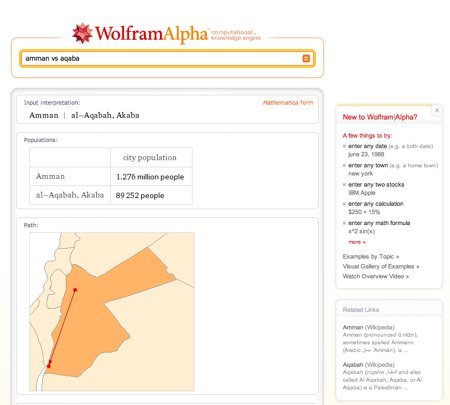
It’s almost like the “super computers” we see in science fiction movies. You ask the computer a question and the computer gives an answer. The question can be a request for historical data, a mathematic equation, the current temperature of a city, and so on. The thing is: the computer “understands” the question.
But this isn’t about science fiction.
We might be looking at a major milestone in computer and knowledge history: Wolfram Alpha was launched last night. I think we can safely say that not since the launch of Google’s search engine (and the mathematic algorithms behind it) or the explosive growth of Wikipedia have we witnessed, as consumers, such an important milestone in how we access and manipulate knowledge.
Yeah, sure YouTube has become a huge database of humanity’s video content and Facebook has connected or reconnected tens of millions. But Wolfram Alpha takes us back to the power of more complex “computing”.
It’s not a search engine that looks for the occurrence of a certain word on some webpage. It brings back data. It understands your question and bring back relevant DATA. It computes, plots, compares. It’s geographic, physical, mathematic, historical.
It’s a totally ambitious project by some really brainy people.
I won’t say more. I advise you to check out the video demo of Wolfram Alpha before trying it out. Then give the site a spin.
Comments
10 responses to “Wolfram Alpha: computing history was made last night”
I wouldn’t call it “History” here. Mathematica software has been around since … oh 1994 and I see this site really shining in auto-generating mathematical representations of equations (I threw a few at it and it looked pretty nice, all with derivatives, a plot, limits, partial differentials,integrals, minima, maxima…etc). Then I took another discipline and couldn’t get it to do anything with Sodium and Chlorine. It managed to nicely “compare” them but couldn’t understand the interactions between them (kind of like forgetting the huge intersection between the two). (Unlike what it did with the mathematical formula, when it dissected it, resolved it in every possible direction and plotted the answer)
I like the representation, and how it tries to understand what you’re asking. But it’s still no wikipedia (which is people archiving what people understand just in electronic format) or a real fully computer based lexical and analytical engine. That looks at all these sources, and
somehowdraws similarities, intersections and differences. Without being a glorified comparison tool.Sorry, got cut off..
However, after all the little glitches in the system have been ironed out (I got, “Sorry dave I can’t do that” few times) I think it has a lot of potential. I think it might replace many of what people do in several stages today into one step.
I think the most driving point is the part about how everything appears to be a generic object with standard properties associated with it. Comparing these properties would provide a lot of information especially when many of them are shared. Like time, length …etc. So you start with an object, add properties that you manage to somehow standarize over everything you know in the world. Then let the computer do some magic with it. I think there’s a lot of potential. I think it will become better with time and resources. I hope, sincerely, that they will succeed in making something that is both understandable by computers and humans. To bridge this gap that we have with search based on Human terms that: Mean nothing to the computer, vary by place, time and knowledge and perception, and also unit.
I hope, more people will see how important such method of archiving is for the human history and knowledge and “chip in”, such an effort is probably a million times more complex than mapping the human genome!
Anybody believing in “AI”, artificial intelligence and stuff like that, might just be plain boring, which is often the case. Mathematica is a great piece of code, but Stephen Wolfram lost it, the marketing of this thing is really a disgusting joke … lol, kinda funny
that’s so cool!
i tried it, it is cool site
While the idea is very exciting (despite its age: people have been talking about it for at least a decade now), semantically-aware search engines are far from usable, including this latest addition. I gave it a spin, and most of my semantically structured queries were answered with “Wolfram|Alpha isn’t sure what to do with your input”. Not very helpful indeed.
I’m very excited about this. Intuitive, fast, great UI—should be great. Hope it catches on.
Tech related question: I live in Weibdeh, and I can’t find a decent photo development place. I need to take in a disposable camera and have them turn it into a digital photo CD. Anywhere in Amman that does this?
Thanks!
That is by far the most interesting thing i came across since Wikicrack…
I had my doubts on the sanity of the Intel executive who envisaged humanity achieving some sort of (singularity) in the next 50 years or so… but such makes me wonder if it could be true! (source)
still, i’m a strong believer in the consensus of the people, be it knowledge, ethics or any other aspect of life. So i might start using Wolframalpha (catchy name) for “factual” data cross-referencing purposes, but Wikipedia with its correlated, trivial and consensus-based information will be my read…
try to ask the meaning of: Blog
it’s really embracing
TED TALKS
Tim Berners-Lee on the next Web (LINKED-DATA):
http://www.ted.com/index.php/talks/tim_berners_lee_on_the_next_web.html